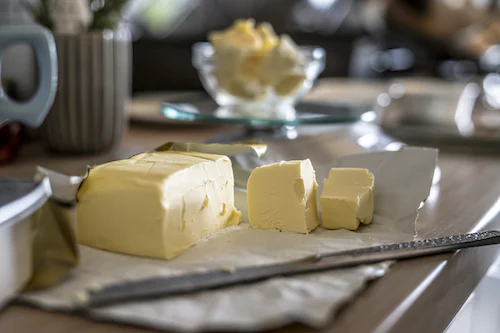Vegan butter is a non-dairy butter substitute that is made entirely from plant-based ingredients. It is a popular choice for those following a vegan or vegetarian diet, as well as people with lactose intolerance or allergies to dairy products. Vegan butter can be used in the same way as traditional butter in cooking and baking and can be found in most grocery stores.
The Ingredients in Vegan Butter
The ingredients used to make vegan butter vary depending on the brand and recipe. However, most vegan butter substitutes are made from a combination of oils, plant-based milk, and emulsifiers. Let’s take a closer look at each of these ingredients.
Oils
Oils such as coconut oil, palm oil, and soybean oil are commonly used in vegan butter. These oils are high in saturated fats, which helps the butter solidify at room temperature, giving it a similar texture to traditional butter.
Plant-based milk
Plant-based milk, such as soy milk or almond milk, is used to provide a creamy and smooth texture to vegan butter. It also adds flavor and helps to emulsify the oils.
Emulsifiers
Emulsifiers such as lecithin or xanthan gum are added to vegan butter to help bind the oils and plant-based milk together. This creates a smooth and creamy texture that is similar to traditional butter.
The Benefits of Vegan Butter
There are several benefits to using vegan butter instead of traditional butter. Firstly, it is a cruelty-free alternative that does not involve animal exploitation. Vegan butter is also lower in saturated fat and cholesterol than traditional butter, making it a healthier option for those concerned about their heart health. Additionally, vegan butter is suitable for people with lactose intolerance or allergies to dairy products.
How Vegan Butter Compares to Traditional Butter
While vegan butter is a suitable substitute for traditional butter, there are some differences to be aware of. Vegan butter has a lower melting point than traditional butter, meaning it may not work as well in certain recipes, such as pie crusts or puff pastry. Vegan butter also has a different flavor profile than traditional butter, so it may take some getting used to if you are used to the taste of traditional butter.
How to Use Vegan Butter in Cooking and Baking?
Vegan butter can be used in cooking and baking in the same way as traditional butter. It can be melted and used as a spread, or added to recipes for baking, frying, or sautéing. Vegan butter works well in recipes such as cakes, cookies, and pastries. It is important to note that vegan butter has a lower melting point than traditional butter, so it may not work as well in certain recipes, such as pie crusts or puff pastry.
Health Benefits of Vegan Butter
In addition to being cruelty-free and environmentally friendly, vegan butter also offers some potential health benefits. Most vegan butter is made with plant-based oils, such as coconut oil or sunflower oil, which are rich in healthy fats. These healthy fats can help to lower cholesterol levels and reduce the risk of heart disease. Additionally, some vegan butter products are fortified with vitamins and minerals, such as vitamin B12 and vitamin D, which are important for overall health and wellbeing.
Vegan Butter Alternatives
While vegan butter is a popular plant-based alternative to traditional butter, there are also other options available. For example, coconut oil, nut butter, and avocado can all be used as spreads or substitutes for butter in recipes. Additionally, there are several brands of plant-based margarine that are suitable for vegans and can be used in the same way as butter.
Cooking Tips for Using Vegan Butter
When cooking with vegan butter, there are a few tips to keep in mind. Firstly, vegan butter has a lower melting point than traditional butter, so it may melt more quickly in the pan. It is also important to use a non-stick pan or to add some oil to prevent sticking. Finally, it is a good idea to experiment with different brands and varieties of vegan butter to find one that works well for your cooking and baking needs.
The Environmental Impact of Vegan Butter
Vegan butter has a significantly lower environmental impact than traditional butter. The dairy industry is a major contributor to greenhouse gas emissions, deforestation, and water pollution. In contrast, the production of vegan butter uses significantly less water and land resources and emits fewer greenhouse gases. Additionally, vegan butter is cruelty-free and does not contribute to animal exploitation.
Conclusion
In conclusion, vegan butter is a plant-based alternative to traditional butter that is made from a combination of oils, plant-based milk, and emulsifiers. It is a cruelty-free, healthy, and suitable option for those following a vegan or vegetarian diet, as well as people with lactose intolerance or dairy allergies. While it may have a different flavor profile and melting point than traditional butter, it can be used in the same way and is readily available in most grocery stores.

